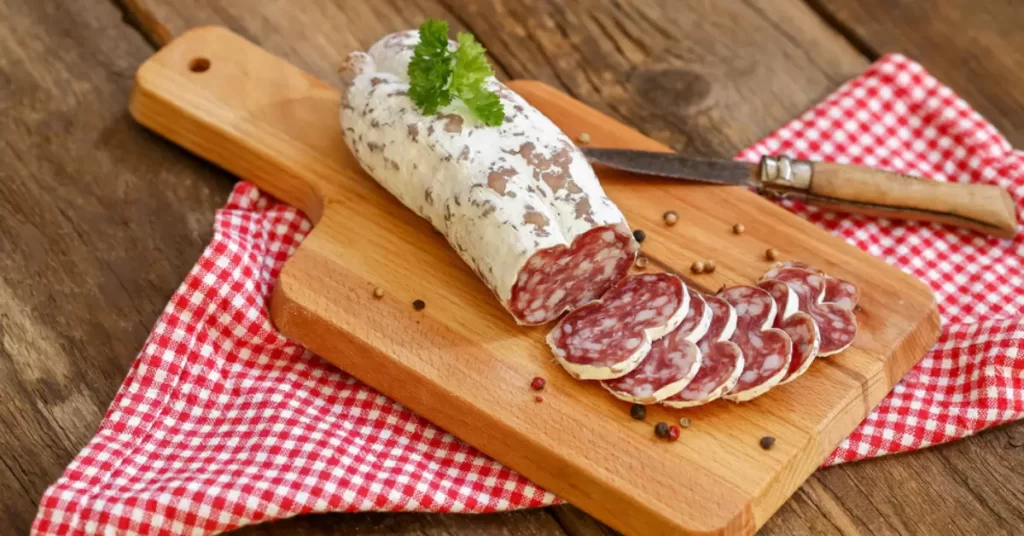There’s a long-standing debate amongst culinary enthusiasts and professional chefs alike: do Corian cutting boards dull knives?
The answer to this question is not as simple as it may seem, as it depends on various factors.
In this article, we’ll explore the properties of Corian cutting boards, how they may affect your knives, and some best practices to maintain your cutting tools.
So, let’s dive into the world of Corian cutting boards and discover if they are the right choice for your kitchen needs.
What is Corian?
Corian is a solid surface material invented by DuPont in the 1960s. It is composed primarily of natural minerals, primarily aluminum trihydrate derived from bauxite ore, and acrylic polymers.
Corian is known for its durability, non-porous surface, and stain resistance, making it a popular choice for countertops, sinks, and cutting boards.
Corian Cutting Boards: Pros and Cons
Corian cutting boards offer numerous benefits, including their non-porous surface, which prevents bacterial growth and makes them easy to clean.
They are also stain-resistant, durable, and available in various colors and designs. However, they can be more expensive than other cutting board materials, and their impact on knives is a topic of debate.

The Impact of Corian Cutting Boards on Knives
Hardness and Knife Sharpness
One of the primary concerns when using a cutting board is how it affects the sharpness of your knives. The hardness of a cutting board’s surface can directly impact the edge of a knife.
Corian is a relatively hard material, and as a result, some people argue that it can dull knives faster than softer materials like wood or plastic.
Corian vs. Other Cutting Board Materials
When compared to other popular cutting board materials, Corian falls somewhere in the middle.
Wooden cutting boards are generally considered to be the most knife-friendly, as they are softer and allow the knife edge to penetrate the surface slightly.
Plastic cutting boards are also considered knife-friendly, but they can develop deep grooves over time, which may harbor bacteria.
Glass and stone cutting boards are the hardest and most likely to dull knives quickly.
Tips for Maintaining Your Knives and Corian Cutting Board
Regular Knife Sharpening
Regardless of the cutting board material you use, it’s essential to regularly sharpen your knives to maintain their performance. A dull knife requires more force to cut, increasing the risk of injury.
Regularly honing your knives with a honing rod and using a whetstone or knife sharpener when needed will ensure your knives stay sharp and efficient.
Cleaning and Care for Corian Cutting Boards
To keep your Corian cutting board in top shape, clean it with mild soap and water after each use. Avoid using abrasive cleaners or scrubbing pads, as they can scratch the surface.
If you notice deep cuts or scratches, you can lightly sand the surface with fine-grit sandpaper to remove them.
Alternatives to Corian Cutting Boards
If you are concerned about the potential impact of Corian cutting boards on your knives, there are several alternative options available:
Wooden Cutting Boards
Wooden cutting boards are widely considered the most knife-friendly option. They are available in various types of wood, such as maple, walnut, and bamboo.
Wooden cutting boards can be more expensive than plastic ones but are generally considered worth the investment due to their durability and gentle impact on knife edges.
Plastic Cutting Boards
Plastic cutting boards are affordable, lightweight, and easy to clean. They are less likely to dull knives than Corian, but they can develop deep grooves over time, which can harbor bacteria. Regular replacement or diligent cleaning can help prevent contamination.
Composite Cutting Boards
Composite cutting boards are made from a blend of wood fibers and resin, creating a surface that combines the benefits of both wood and plastic. They are gentle on knives, easy to clean, and more resistant to bacterial growth than wooden cutting boards.
FAQs
Are Corian cutting boards safe for all types of knives?
Yes, Corian cutting boards can be used with all types of knives. However, due to the hardness of Corian, it may cause knives to dull faster than when using softer materials like wood or plastic. Regular knife maintenance can help mitigate this issue.
Is it safe to use a Corian cutting board for raw meat?
Yes, Corian cutting boards are safe for cutting raw meat, as their non-porous surface prevents the growth of bacteria. Be sure to clean the cutting board thoroughly after each use to prevent cross-contamination.
Can I place hot pots and pans on a Corian cutting board?
While Corian is heat-resistant, it is not recommended to place hot pots and pans directly on a Corian cutting board.
Prolonged exposure to high temperatures can cause discoloration and may even damage the surface. Instead, use trivets or heat-resistant mats to protect your cutting board from heat damage.
Conclusion
In conclusion, while Corian cutting boards have many advantages, their impact on knife sharpness is a valid concern. The hardness of Corian may cause knives to dull faster than when using softer materials like wood or plastic.
However, with regular knife maintenance and proper care, a Corian cutting board can still be a useful addition to your kitchen.
If preserving knife sharpness is your top priority, consider alternative cutting board materials such as wood, plastic, or composite boards.
